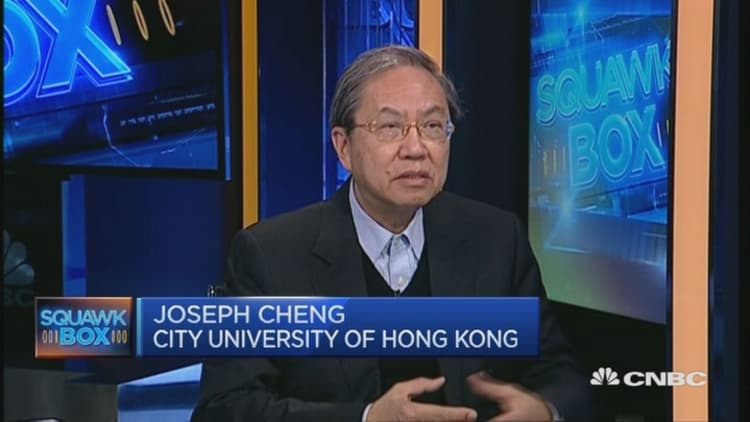Joshua Wong, prominent student activist from Hong Kong's 2014 Umbrella Movement, blames the deteriorated relationship between police and the people of Hong Kong for the Mong Kok riots on Monday.
"Those relations have reached a critical point of hostility and Hong Kong demonstrators are using violence to challenge the police's violence and fight against the rule of law," said Joshua Wong, in a self-authored TwReporter.org article.
A ballooning crowd began protesting government officials' clearing of illegal street vendors -- many of whom were selling local food -- at a central intersection on Monday night, which was also the first day of the Lunar New Year. The riot police were also deployed to the area.
Tensions quickly escalated into a violent clash between protestors and the police in Tuesday's early hours. Protesters threw large objects and bricks pried from the sidewalks at the police, who had initially fired warning shots and then used pepper spray and batons on protestors.
The Mong Kok riots were reportedly the most violent clashes in Hong Kong since November 2014 and have been trending on social media as the #FishballRevolution.
The riots are the culmination of "two years of heated dissatisfaction and public distrust of the government," said Wong in the TwReporter.com article.
He pointed to the disappearance of the Causeway Bay Books staff and a 2014 incident in which seven policemen who had attacked a protestor for nearly four minutes as reasons behind the Hong Kong public's dissent.
Demonstrators are "using force to defend the social values they believe in," said Wong.
Wong said while he empathized with demonstrators, he does not condone the use of violence, preferring a "non-violent struggle for Hong Kong people's rights."
The 19-year old student activist also warned of Hong Kong citizens' growing defiance, which "will not disappear just like that." He added that there is a snowball effect for "ignoring the violent crimes of the police who have reached unacceptable levels of brutality."
Hong Kong's Chief Executive CY Leung addressed the protectorate in a television-aired statement on Tuesday, condemning demonstrators and voicing his support for the police force.
"A few hundred [demonstrators] attacked police officers and the media in Mong Kok. They damaged police cars and public properties, committed acts of arson, threw bricks and odd objects at police officers, including those who had already been injured and lying on the ground," said Leung.
"The SAR (Special Administration Region) government strongly condemns such violent acts, the police will apprehend the [demonstrators] and bring them to justice," said Leung, who also voiced his sympathies for injured police officers.
Not about Fishballs
The police-public clash wasn't just about Hong Kong's street food.
The Mong Kok riot follows the 2014 Umbrella Movement protests, which blocked major streets in Hong Kong for months, as pro-democracy activists braved tear gas, pepper gas and police baton charges.
The protesters' primary demand was the ability to select candidates for Hong Kong's chief executive post, rather than being forced to choose from a slate pre-determined by Beijing. Other demands have included the resignation of the unpopular current chief executive, CY Leung. The demands weren't met and that protest ended in December 2014 after authorities cleared away barricades and tent cities.
Joseph Cheng, founder of Power for Democracy, a pro-democracy political group, said the Mong Kok riot was "an unexpected clash between regulators and illegal hawkers who are usually quite tolerated during the Chinese New Year period."
Similarly, the Hong Kong student activist group Scholarism said in a statement released today that the unlicensed street stalls are "cherished and viewed as a precious heritage" of Hong Kong.
Media reports indicate that Hong Kong Indigenous, a local rights group, was heavily involved in the Mong Kok protests. Hong Kong Indigenous was founded after the Umbrella Revolution, and its members harbor strong anti-mainland sentiment.

The group confirmed on its official Facebook page that Edward Leung Tin-Kei, its candidate for the upcoming Legislative Council by-elections was arrested Tuesday.
Groups such as the Hong Kong Indigenous and radical youth groups are dissatisfied with the "unpopular administration who have been refusing to talk to the public and to the opposition and these groups," Cheng told Asia Squawk Box.
He explained that factions such as the Hong Kong Indigenous and radical youth groups "believe the only way to express their grievances are to take part in direct action against the authorities."
But Cheng was concerned that such violent protests may be a fillip to "the [Hong Kong] administration and cause a public opinion backlash against the mainstream, moderate and pro-democracy groups."
Follow CNBC International on Twitter and Facebook.
-- CNBC's Huileng Tan contributed to this report



